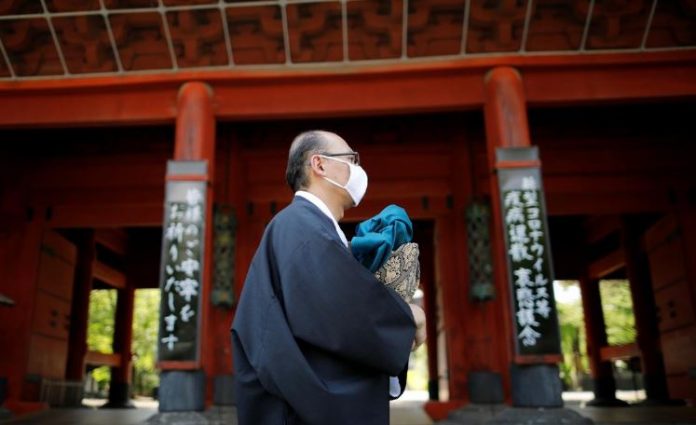Japanese Prime Minister Shinzo Abe said on Friday he was leaning towards extending the country’s state of emergency for about a month as experts said coronavirus restrictions should remain in place until the number of cases falls further.
The emergency is now due to expire on May 6 but Abe said the situation remains tough and further cooperation is needed from Japanese citizens, although he would make a final decision on May 4 after consultations with experts.
“Thanks to the efforts of our citizens, we have managed to avoid an explosion of cases as has been seen overseas,” Abe told reporters on Friday evening. “But the medical situation remains tough and we must call for forther cooperation from our nation.”
He added that he was inclined towards extending the state of emergency for roughly a month and would hold a news conference to explain his decision.
On Thursday, Abe warned citizens to prepare for a “drawn-out battle” against the new coronavirus and political sources told Reporters the government was planning to lengthen the emergency for about a month.
Abe said he would base his final decision on the recommendation of a panel of experts, which said earlier on Friday that while the number of cases appeared to be on the decline, the situation was not as good as they would like.
“For a while, we are going to need to keep these policies going,” panel member Shigeru Omi told a news conference, adding that there were regional variations in outbreaks and the medical system in some areas was struggling to cope.
Economics Minister Yasutoshi Nishimura said experts had also said some regions needed to keep strict restrictions in place while others could start to ease them. Abe said he would consider this matter in making his final decision.
Japan has confirmed more than 14,000 cases and 436 deaths from COVID-19, the highly contagious lung disease caused by the new coronavirus, according to an NHK tally.
Of the confirmed cases, more than 4,000 were in the capital, Tokyo, with 165 new ones reported on Friday.
But there are worries that Japan’s limited testing regime has undercounted many likely coronavirus cases, and fears that the medical system may be strained caring for them.
The outbreak and the concurrent slump in business activity is darkening the outlook for the world’s third biggest economy, prompting calls for more spending even after parliament approved an extra budget to fund a $1.1 trillion stimulus package.
Consumer prices in Tokyo fell for the first time in three years in April and national factory activity sagged, data showed on Friday, increasing worries the coronavirus outbreak could tip the country back into deflation.
The government has appealed for vigilance during the long Golden Week holiday – normally a peak travel period – that runs through May 6, calling on people to stay home and reduce contact with others.
Abe declared the emergency on April 7, initially for Tokyo and several other prefectures after a jump in infections, and later extended it nationwide.
It gives governors greater power to tell people to stay at home and ask businesses to close, but in most cases does not mandate penalties for non-compliance, relying instead on social pressure and traditional respect for authority.
Tokyo has seen a decline in daily reported cases since hitting a peak of 201 on April 17, with further falls into double digits this week. But the city’s governor, Yuriko Koike, has warned residents not to be complacent.
On Friday, the Nippon Foundation, a philanthropic organisation, unveiled the first wing of a field hospital built in a waterside district of Tokyo.
Set up in an arena built for Paralympic sports, the 100-bed facility features alcoves containing a bed, locker and table set apart from each other. Other beds will be put in tents and expanded as needed, NHK reported.
The International Olympic Committee and the government in March postponed the summer Olympic and Paralympic Games in Japan for a year, until July 2021, because of the COVID-19 pandemic.
Source – News Agencies
















